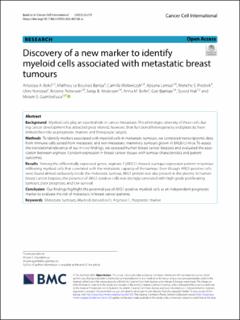Discovery of a new marker to identify myeloid cells associated with metastatic breast tumours
Bokil, Ansooya Avinash; Børkja, Mathieu; Wolowczyk, Camilla Izabel; Lamsal, Apsana; Prestvik, Wenche S.; Nonstad, Unni; Pettersen, Kristine; Andersen, Sonja Benedikte; Bofin, Anna M.; Bjørkøy, Geir; Hak, Sjoerd; Giambelluca, Miriam Soledad
Peer reviewed, Journal article
Published version
Permanent lenke
https://hdl.handle.net/11250/3112430Utgivelsesdato
2023Metadata
Vis full innførselSamlinger
Sammendrag
Background: Myeloid cells play an essential role in cancer metastasis. The phenotypic diversity of these cells during cancer development has attracted great interest; however, their functional heterogeneity and plasticity have limited their role as prognostic markers and therapeutic targets. Methods: To identify markers associated with myeloid cells in metastatic tumours, we compared transcriptomic data from immune cells sorted from metastatic and non-metastatic mammary tumours grown in BALB/cJ mice. To assess the translational relevance of our in vivo findings, we assessed human breast cancer biopsies and evaluated the association between arginase 1 protein expression in breast cancer tissues with tumour characteristics and patient outcomes. Results: Among the differentially expressed genes, arginase 1 (ARG1) showed a unique expression pattern in tumour-infiltrating myeloid cells that correlated with the metastatic capacity of the tumour. Even though ARG1-positive cells were found almost exclusively inside the metastatic tumour, ARG1 protein was also present in the plasma. In human breast cancer biopsies, the presence of ARG1-positive cells was strongly correlated with high-grade proliferating tumours, poor prognosis, and low survival. Conclusion: Our findings highlight the potential use of ARG1-positive myeloid cells as an independent prognostic marker to evaluate the risk of metastasis in breast cancer patients. Discovery of a new marker to identify myeloid cells associated with metastatic breast tumours

